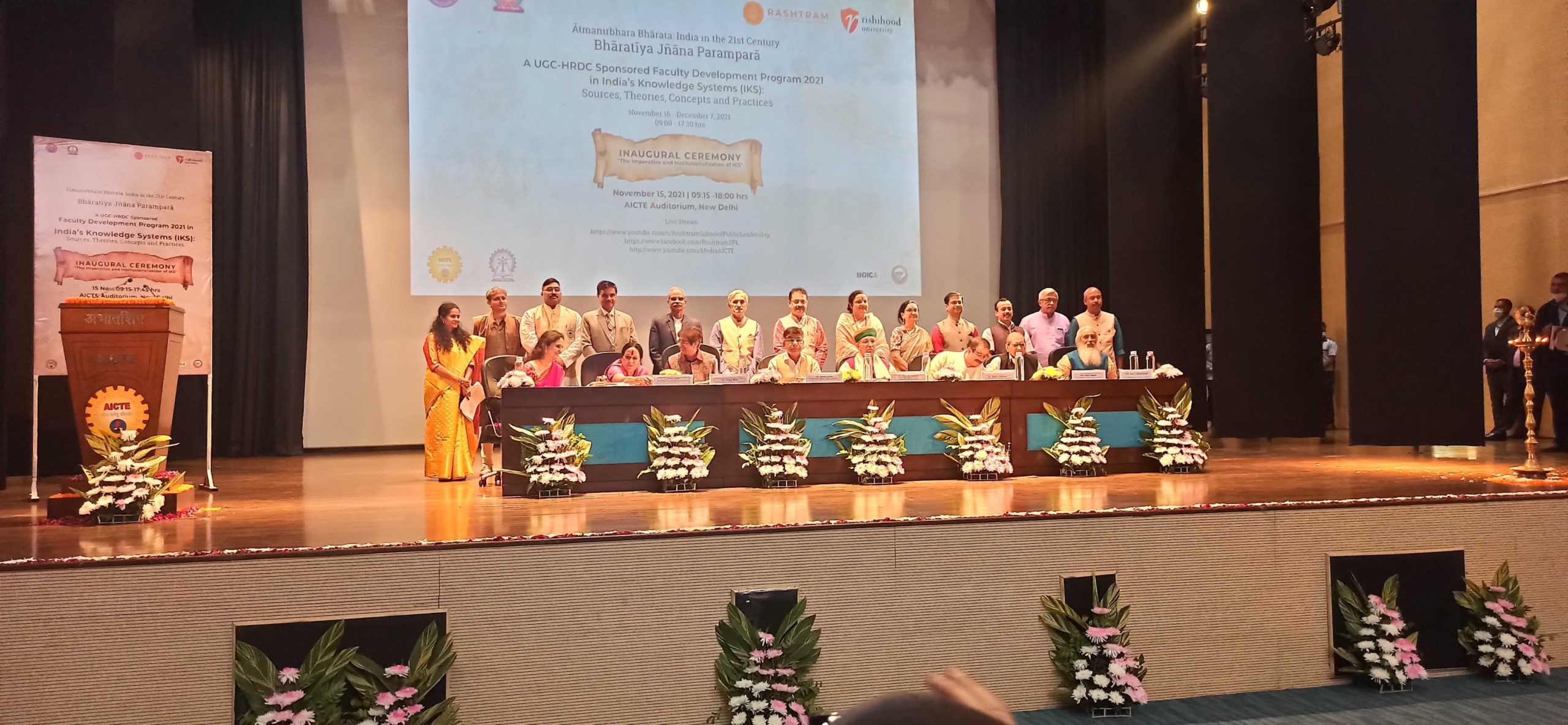By Anshuman Panda, Learner at Rashtram
In the year 1835, under the stewardship of T.B Macaulay, a new education policy was foisted on Bharat [1]. After much debate among the Orientalists and Anglicists, both operating from a coloniser’s consciousness, the latter prevailed. The stated objective of creating a class, who were Indians in blood and colour but English in taste and opinions, succeeded and how. So far-reaching were its consequences, that it took a full 74 years after the Britishers left for an initial blow to be struck at the roots of this system. This small but valuable blow has come in the form of the Bharatiya Jnana Parampara- Faculty Development Program organized by Rashtram School of Public Leadership, for helping reorient the new education policy on the basis of Bharat’s Knowledge Systems.
The inaugural event was hosted at the AICTE headquarters, with the program consisting of an impressive list of stalwarts. The amazing part was the coming together of ministers, administrators, and thought leaders, expressing a common intent and a shared vision. The audience had the privilege of gaining deep insights into the nuts and bolts of the new National Education Policy (NEP) and steps being taken to incorporate the indigenous approaches to knowledge.
We Need Gurus
‘We need contemporary gurukulams, but for that, we need Gurus, not just teachers’. Speaking on the current education system, Prof. Geeta Singh Director CPDHE, noted that it is capable of delivering progress, but fails to achieve the goal of character building. In gurukulams, the children learn not only from the teaching but also by observing the Guru, thus Shiksha. Echoing her vision, eminent educationist Dr. Kapil Kapoor said that the current mool mantra of 3E-English, Education, and Employment, needs to be altered. Quoting Shri Aurobindo, he said that the person who forgets his language loses his voice, and those who forget their knowledge lose their Chitta Bhoomi.
Shri Aurobindo and Swami Vivekananda appeared to be the guiding lights for all the speakers unanimously. In that light, Dr Subhas Sarkar, the honorable Minister of State for Education explained the relevance of sacredness in science saying Science without religion is lame, and religion without science is blind. Similarly, Shri Arjun Meghwal, honorable Minister of State for culture, explained how Swami Vivekananda had once made the mistake of judging a person by their profession and his regret upon realizing his mistake.
Power of Institutions
The need for institutionalization of Bharatiya knowledge traditions was echoed from all quarters. From Prof. Anil Sahasrabudhe to Dr Sonal Mansingh ji, everyone acknowledged that for mainstreaming BKS, the institutional approach was the need of the hour. What came as a pleasant surprise to most of the audience was the news of more than 10000 gurukulams still functioning in the country. Shri Mukul Kanitkar, the organizing secretary of Bharatiya Shikshan Mandal also spoke of gurukulams devoted to Dhanurvidya still functioning in Kashi, an art which was thought to be lost.
A promise was made to mainstream these institutions and to learn pedagogy from them. In the same vein, a Memorandum of Understanding was signed between Rishihood University and Research for Resurgence Foundation, to provide greater impetus to the pursuit of BKS in the country.
The special value of Bharatiya Knowledge Systems is that it doesn’t strike a distinction between theory and praxis. Any knowledge which is applicable is worthy of pursuit. Expounding on this principle, on a perceived abstract subject such as consciousness, Mata Divyananda of Sharada Math gave the example of electromagnetism. When Maxwell discovered electromagnetism, he was asked about its utility by his contemporaries, who considered it as a mere mental cerebration. To this Maxwell had responded by asking, “What is the utility of a newborn child?” Truly, explained Mata Divyanada, a newborn child has no immediate utility but is a fount of unlimited potential. Thus, with consciousness.
Towards the end, various approaches were discussed to gradually implement the transition towards BKS. On a lighter note, Dr. Richa Chopra, the Sutradhar of the program, suggested a carrot and stick approach. The audience at the end of the day came out much enriched intellectually and with an assurance that the wheel of change has begun to turn for the better. It is our fervent hope that the program becomes the transformational tool that it is intended to be and Bharat reclaims her rightful place as a knowledge hub of the world.
References:
1. India That Is Bharat, by J Sai Deepak

